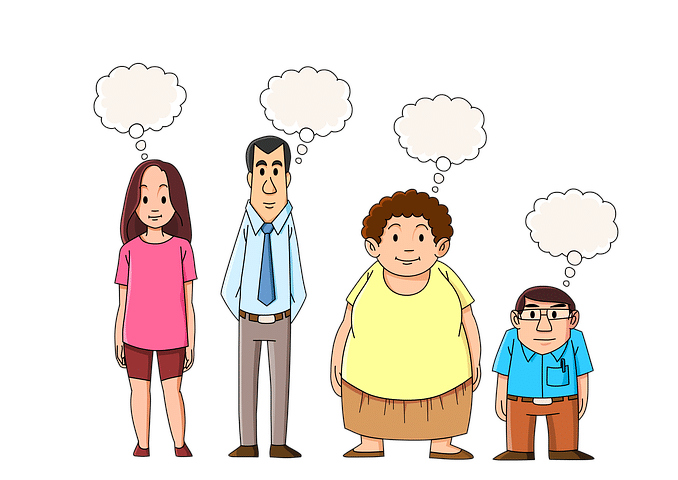Recently an actor had to defend his young school going teen’s choice of clothes online when she was snapped on an airport and subject to vicious body shaming and lustful comments by trolls. Body Shaming is real and with the world being connected online, this is not limited to your neighborhood but the whole world, who are online seem to think they are entitled to give a piece of their mind – however pitiful it might be!
In today’s superfluous online world where every snap or outing is being posted online, it is tough to remember that the online photos and comments don’t matter as much as the real ‘YOU’. This is especially true for Teens and pre-teens when they first get the taste of social inter-connected world. While it is fun to be online, share your latest photos on Instagram and wait for the internet love that your followers would share, it can quickly turn into a nightmare if the picture or video is trolled.
What is Body Shaming?
High School years are all about looking good and trying to fit in. It is also a time when they are hit by adolescence which makes these superficial things extremely important to them. Getting the maximum likes for a photo on Instagram might be as important as scoring well in the test next day. As parents we might not understand it, but we need to realize that teens are vulnerable when it comes to body image.
What promotes Body Shaming?
The usually non consequential “You seemed to have gained weight” or “Oh! Dear, have you been out in the sun? Why so dark?” could have an effect on the young minds. The society has formed a set standard around fairness, beauty and attractiveness. Any person who does not fit in those standards can be subjected to body shaming. Social Media, online apps and models or the advertising and media industry in general isn’t helping much in establishing a positive body image either.
What is Body Image?
Body image means how and what you think about your body. Having a positive body image means being happy and satisfied with your body. Being comfortable and accepting the way you look is the most important step towards positive body image.
A negative body image could mean being unhappy with the way you look. In this case the person usually wants to change their body size or shape.
A few tips to help children embrace their bodies and looks:
- Don’t comment on their looks
A worried statement about your teen not eating healthy enough is fine, but do not comment on their or their friends looks or skin color. It is important that children understand to look beyond these physical attributes and like a person for who they are. If your child has tried a new hairstyle, don’t be quick to share your opinion. Listen in on how they feel about it. It’s okay to experiment and when we accept that our kids learn more about accepting variations than confirming to set standards. - Be a positive role model
You can’t think of instilling positive body image in children when you stand in front of the mirror and compare yourself to someone else or fuss over your 2 kg weight gain! Similarly if you gossip about someone’s weight and skin tones while your kids are around, it will cement a certain set of beauty standards in the child’s mind.
Be a positive role model. Insist on healthy eating and regular exercise than focusing on a certain figure. - Promote healthy eating and living
High school is usually a time when children will be assertive about their choices. Focus on communicating the long term effects of healthy eating and living. Occasional choice of fries, junk food and sugar laden beverages is fine, but tell them why it shouldn’t be a habit.
Healthy eating and living will also help them manage stress and be happy with their choices. - Talk about diversity loving your body
Today, as children are exposed to a variety of cultures and people from a young age, it is important to talk about diversity and various body types. They need to understand that things like skin tones, a person’s figure etc. largely depend on genes than anything else. It is laughable to expect every person to confirm to a set standard of beauty. - Communicate that social media isn’t real
Social Media and influencers are getting high tech these days. Gone are the days of a simple, click-upload and forget days. Today more and more images are created and crafted with multitude of apps. The smart phones change everything from skin tones to light angles and weight! It is important that teens know this and understand that everything online should be taken with lots of salt! - Explain the importance of company they keep
At times Teens might be highly influenced with their friend’s opinions and hence it is important to see and understand the company they keep. Do not hesitate to point their friend’s mistakes if they are around body shaming. However do not ask them to avoid the friend altogether. Teach them ways to stand their ground without being hurtful or submissive.
Ask teens to look for positives in themselves and their friends instead of just physical attributes. Someone might be a great team player, while the other might be a good athlete. Some might sing well while the other might be determined. Explain that these qualities can help build character than flawless skin and hourglass figures.
We love to hear what you wish to say. Do share your views and tips in comments below.











While I advocate body positivism concept, I just fear that kids might t treat it as an excuse to inculcate unhealthy habits and then be comfortable in their body.
Teens are obsessed with glitz and glamour of movie and tv stars. Surprisingly, they always fall for slim trim role models. In boys’ case, they think body building is a great way to show off personality. That’s where body shaming starts from for self and others.
Very nice.
I have been seeing this a major issue among teens and even pre-teens these days. Either they are body shaming others or being a victim of it. Either way, it is crucial for parents to intervene and explain that all shapes and sizes are beautiful. If everyone was perfect, this world would be so boring! What matters is your confidence and self-esteem to carry yourself. Great article!